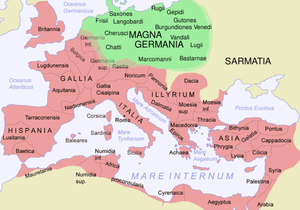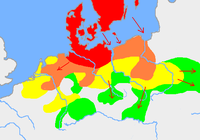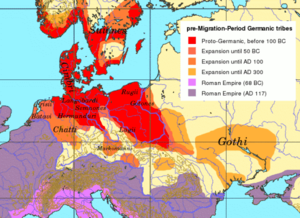- Germania
-
Not to be confused with Germany.For other uses, see Germania (disambiguation).
Germania (Greek: Γερμανία) was the Greek and Roman geographical term for the geographical regions inhabited by mainly by peoples considered to be Germani. It was most often used to refer especially to the east of the Rhine and north of the Danube. These areas were mainly Celtic (specifically Gaulish) and had become part of the Roman Empire.[1][2]
Some Germani, perhaps the original people to have been referred to by this name, had lived on the east side of the Rhine. At least as early as the 2nd century BC. This area was considered to be in "Gaul", and became part of the Roman empire. These were the so-called germani cisrhenani, who in modern terms lived in the region of modern eastern Belgium, the southeastern Netherlands, and stretching into Germany towards the Rhine. During the period of the Roman empire, more tribes were settled in areas of the empire near the Rhine, in territories controlled by the Roman Empire. Eventually these areas came to be known as Lesser Germania, while Greater Germania (Magna Germania) was the larger territory east of the Rhine.
The Roman parts of Germania, "Lesser Germania", eventually formed two provinces of the empire, Germania Inferior, "Lower Germany", which came to eventually include the region of the original germani cisrhenani and Germania Superior, which in modern terms comprised an area of western Switzerland, the French Jura and Alsace regions, and southwestern Germany. Important cities were Besançon (Besontio), Strasbourg (Argentoratum), Wiesbaden (Aquae Mattiacae), and Mainz (Mogontiacum).
Contents
Origins of the term
The name came into use after Julius Caesar and whether it was used widely before him amongst Romans is unknown. The term may be Gallic in origin. Caesar reports hearing from his Remi allies that the term germani was the term used for the germani cisrhenani, and that these tribes had historically come from over the Rhine. So the name Germania seems to have been extended to cover the similar tribes in the area understood to be their homeland.[3][4] Some generations later, Tacitus claimed that this is precisely what happened, saying that the Tungri of his time, who lived in the area which had been home to the germani cisrhenani, had changed their name, but had once been the original Germani. Tacitus wrote in AD 98:
For the rest, they affirm Germania to be a recent word, lately bestowed. For those who first passed the Rhine and expulsed the Gauls, and are now named Tungrians, were then called Germani. And thus by degrees the name of a tribe prevailed, not that of the nation; so that by an appellation at first occasioned by fear and conquest, they afterwards chose to be distinguished, and assuming a name lately invented were universally called Germani.[5]
The Germania of Caesar and Tacitus was not defined along linguistic lines as is the case with the modern term "Germanic". They knew of Celtic tribes living in Magna Germania, and Germanic tribes living Gaul. It is also not clear that they distinguished the tribes into linguistic categories in any exact way. The language of the germani cisrhenani, as well as their neighbours across the Rhine, is still unclear. Their tribal names and personal names are generally considered Celtic, and there are also signs of an older Belgic language which once existed between the contact zone of the Germanic and Celtic languages.germany was founde fsdjfa
Germania in its eastern parts was likely inhabited by early Baltic and Slavic tribes. These parts of eastern Germania are sometimes called "Germania Slavica" in modern historiography.
History
Germania was inhabited by different tribes, the vast majority Germanic but also including some Celtic, Baltic, Scythian, and proto-Slavic peoples. The tribal and ethnic makeup changed over the centuries as a result of assimilation and, most importantly, migrations. The Germanic people spoke several different dialects.
Classical records record little about the people who inhabited the north of Europe before the 2nd century BC. In the 5th century BC, the Greeks were aware of a group they called Celts (Keltoi). Herodotus also mentioned the Scythians but no other tribes. At around 320 BC, Pytheas of Massalia sailed around Britain and along the northern coast of Europe, and what he found on his journeys was so strange that later writers refused to believe him. He may have been the first Mediterranean to distinguish the Germanic people from the Celts. Contact between German tribes and the Roman Empire did take place, not always hostile. Recent excavations of the Waldgirmes Forum show signs that a civilian Roman town was established there, which has been interpreted to mean that Romans and Germanic tribesmen were living in peace, at least for a while.[6]
Caesar described the cultural differences between the Germanic tribesmen, the Romans, and the Gauls. He said that the Gauls, although warlike, could be civilized, but the Germanic tribesmen were far more savage and were a threat to Roman Gaul and so had to be conquered. His accounts of barbaric northern tribes could be described as an expression of the superiority of Rome, including Roman Gaul. Caesar's accounts portray the Roman fear of the Germanic tribes and the threat they posed. The perceived menace of the Germanic tribesmen proved accurate. The most complete account of Germania that has been preserved from Roman times is Tacitus' Germania.
Roman conquests
The occupied Lesser Germania was divided into two provinces: Germania Inferior (Lower Germania) (approximately corresponding to the southern part of the present-day Low Countries) and Germania Superior (Upper Germania) (approximately corresponding to present-day Switzerland and Alsace).
The Romans under Augustus began to conquer and defeat the peoples of Germania Magna in 12 BC, having the Legati (generals) Germanicus and Tiberius leading the Legions. By AD 6, all of Germania up to the River Elbe was temporarily pacified by the Romans as well as being occupied by them. The Roman plan to complete the conquest and incorporate all of Magna Germania into the Roman Empire was frustrated when Rome was defeated by the German tribesmen in the Battle of the Teutoburg Forest in AD 9. Augustus then effected Roman withdrawal from Magna Germania (completed by AD 16) and established the boundary of the Roman Empire as being the Rhine and the Danube.
Modern use
Names of Germany in English and some other languages are derived from "Germania", though the country's own inhabitants call it "Deutschland". Several modern languages use the name "Germania" including Hebrew (גרמניה), Italian (Germania), Bulgarian (Германия), Maltese (Ġermanja), Greek (Γερμανία), Macedonian (Германија), Romanian (Germania), Russian (Германия), Albanian (Gjermania), and Armenian (Գերմանիա).
See also
- Roman Iron Age
- Germanic languages
- Germanic peoples
- Limes Germanicus
- Germany
- Scandinavia
- Low countries
References
- ^ Stümpel, Gustav (1932) (in German). Name und Nationalität der Germanen. Eine neue Untersuchung zu Poseidonios, Caesar und Tacitus. Leipzig: Dieterich. p. 60. OCLC 10223081.
- ^ Feist, Sigmund (in German). Germanen und Kelten in der antiken Überlieferung. Baden-Baden.
- ^ Schulze, Hagen (1998). Germany: A New History. Harvard University Press. p. 4. ISBN 0-674-80688-3.
- ^ "German", The Concise Oxford Dictionary of English Etymology. Ed. T. F. Hoad. Oxford: Oxford University Press, 1996. Oxford Reference Online. Oxford University Press. Retrieved March 4, 2008.
- ^ Tacitus, Germania 2.
- ^ Jones, Terry and Alan Ereira (2006), "Terry Jones' Barbarians", p.97. BBC Books, Ltd., London, ISBN 9780563539162.
Further reading
- Malcolm Todd (1995). The Early Germans. Blackwell Publishing.
- Peter S. Wells (2001). Beyond Celts, Germans and Scythians: Archaeology and Identity in Iron Age Europe. Duckworth Publishers.
External links
- Germania (Roman provinces)
- 1849 Harper New York Map, Ancient Germanic Tribes and Towns
- Tacitus' Germania at the Latin Library (text in Latin)
- Tacitus' Germania: English translation (Gordon, c.1910, proofed by Halsall at fordham.edu.)
Germanic peoples Languages Prehistory Roman Iron Age Magna Germania · Wars with Rome · Battle of the Teutoburg Forest · Germania · Irminones · Ingaevones · Istvaeones · Chatti · Marcomanni · SuebiMigration Period Germanic Iron Age · Alamanni · Anglo-Saxons (Angles · Jutes · Saxons) · Burgundians · Dani · Franks · Frisii · Geats · Goths (Visigoths · Ostrogoths · Valagoths · Gothic Wars) · Gotlanders · Lombards · Suebi · Suiones · Vandals · Varangians · Christianization of the Germanic peoples · RomanizationSociety and culture Mead hall · Poetry · Migration Period art · Runes (Runic calendar) · Sippe · Law (Lawspeaker · Thing) · Calendar · King · Names · Numbers · Romano-Germanic cultureReligion Wodanaz · Veleda · Tuisto · Mannus · Paganism (Anglo-Saxon · Continental Germanic mythology · Frankish · Norse) · Christianity (Arianism · Gothic)Dress Warfare Burial practices List of Germanic peoples · Portal:Ancient Germanic culture  History of the Roman Empire by European Territory
History of the Roman Empire by European Territory 
Europe  Categories:
Categories:- Ancient Roman provinces
- History of Denmark
- History of Germany
- History of the Germanic peoples
- History of the Netherlands
- Prehistory of Poland (until 966)
Wikimedia Foundation. 2010.



